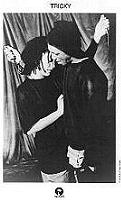
TRICKY

TRICKY
"There's no unifying force to my album, except confusion. It's totally naive -- I've gone into it with no preconceptions, no boundaries, 'cause I'm not musically trained," drawls Tricky in his thick British accent. The 27 year old producer/lyricist/rapper fidgets in his chair.
"It's totally coming from "my mind, so it's filled
with contradictions,
chaos, paranoia and happiness... all loosely linked...
like a jigsaw with some of the pieces missing."
After one listen to Maxinquaye, Tricky's debut album on Island, you'll know what he's thinking about... almost. It takes two or three spins to really soak it up. The record came in at number 3 on the UK top 40 charts in late '94, preceded and followed by a flurry of British press touting its creator as a genius. (He's since lent his production skills to Neneh Cherry and Bjork.)
Now Tricky is unleashing his tripped-out musical vision on the states - a vision influenced by everything from Rakim and Slick Rick to PJ Harvey.
On Maxinguaye, Tricky cut and pasted snippets of hip hop, ambient, dub, crunching rock guitars and any other odd sound that struck his fancy, representing what he calls the "Mutant Age of Evolution." Apocalyptic, atmospheric and sexy all at once, his mutant mixture could easily double as a score to the next Mad Max flick. Rounding out the package are his deadpan rap-growls and the ghostly singing of his pal, Martina, each delivering stark, often brutal lyrics about love, life and depression.
"I'm very honest, in my lyrics and with people," muses Tricky. "It's not always healthy to be so up front, but fuck it."
In fact he's notorious for that attitude, developed early on as a hoodrat on the rugged streets of Bristol, England. Tricky is quick to downplay links between the death of his mum at age 4, teenage scraps with the law and the twisted soul reflected on his album.
"Everyone has deaths in the family. The British media make me out to be this wounded creature -- weird, dark and sinister. And I play it up sometimes. But most of my childhood, I remember having a laugh at school. I had a wicked time, really."
He fell in with the Wild Bunch, the crew of DJ's and NC's responsible for Bristol's hottest underground parties. Tricky would show up, grab the mic and rock it becoming a "big fish in a small pond." When members of the Wild Bunch morphed into the dance act, Massive Attack and got signed, Tricky lent his vocals on their first album Blue Lines and vocals, production, and lyrics on their follow up, Protection.
Somewhere within that time span (Tricky admits he's hazy on dates), he also met Martina. He was so blown away by her voice -- ethereal with just enough abrasiveness to hook any ear -- that he took her into the studio and recorded "Aftermath." His Massive Attack buddies weren't interested and the record collected dust. Feeling held back and pissed off, Tricky ultimately up and moved to London to pursue a solo career.
Three years after its initial recording, he pressed up a few thousand vinyl copies of "Aftermath" on his own, passed it around and set off a major underground buzz. Then the labels started trying to make contact, which was no easy feat since Tricky had no permanent address. Island managed to get a hold of him, signing an unorthodox deal that lets him record with any label.
"Record companies don't move fast enough for me," he says. "If I do a tune, I want to hear it straight away. My contract lets me record with anybody."
Island dropped his next single, "Ponderosa" and did a mass pressing of "Aftermath." Both singles received critical respect and "caused a mad vibe." His subsequent self-produced album Maxinguaye blew up in Europe and it was time for Tricky to cross the Atlantic.
Named after Tricky's mum (he took artistic license and rearranged the "e"), the album sounds like nothing you've heard before, with an array of sampled sounds so tweaked and mutated that they no longer belong to their original owners. You'll hear an Isaac Hayes sample on the slow and slinky "Hell is Round The Corner." And you might catch the Smashing Pumpkins drum track on "Pumpkin." But most of Tricky's aural borrowings are as indicernable as they are diverse.
"Ponderosa" is a disturbed slow jam, illustrating the paranoia that can overtake an idle mind -- almost a foil to Tricky's own anxious nature. "I can't relax long enough to do nothing," he says. "I can't sit still. I've got to keep creating music and giving birth."
"Abbaon Fat Track" is a middle finger to the world, particularly London's pretentious music industry, with lines like: "I'll fuck you up the ass/Just for a laugh." "Suffocated Love" challenges the idealistic pillow talk found in so many other songs, offering Tricky's own jaded insights; "Overcome In 60 Seconds" takes a more optimistic stance on the subject, as opiatic tribal beats propel lyrics recycled from Massive Attack's "Karmacoma."
"Aftermath" is jangly weave of orchestral strings,
flutes, and rock guitar riffs; "Feed Me" is, in Tricky's words, "an Alice
in Wonderland fairy dream," set to the tune of Quaalude funk; and the
twangy sonic tapestry, "Strugglin"' is Tricky's take
on gangsta rap.
"Black Steel In The Hour Of Chaos" transforms the
daunting Public
Enemy rap song into a full throttle metal guitar
assault. "Chuck
D's lyrics are like watching a film," smiles Tricky.
Along with
Chuck D, Tricky's hip hop faves include Rakim, Slick
Rick, Method
Man and Ultramagnetic MCs, who did the remixes for
"Ponderosa."
The frenetic "Brand New, You're Retro" is one of the few songs where Tricky actually dominates the mic instead of Martina. On it, he takes a piss on all the derivative bands who think they're doing something truely innovative. The song echoes his disdain for the barrage of catch-phrases and labels used to peg his own musical style.
He's repeatedly lumped together with Massive Attack and Portishead as part of "The Bristol Sound." He's been called "Tom Waits on acid." Then there's the one that really gets under his skin: "The Majesty of Trip Hop," a title he staunchly denies.
"These labels and titles are meaningless, really. We can't kid ourselves and say we're doing something new. Because we're not. For example hip hop -- it's always been trippy and weird. We're just mutating what's been done before."
Tricky's Maxinquaye takes the concept of mutation to a whole new level.
# # #
